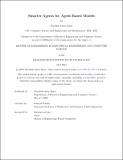| dc.contributor.advisor | Raskar, Ramesh | |
| dc.contributor.author | Kuru, Nurullah Giray | |
| dc.date.accessioned | 2024-09-16T13:50:22Z | |
| dc.date.available | 2024-09-16T13:50:22Z | |
| dc.date.issued | 2024-05 | |
| dc.date.submitted | 2024-07-11T14:37:09.621Z | |
| dc.identifier.uri | https://hdl.handle.net/1721.1/156806 | |
| dc.description.abstract | Agent-based models (ABMs) are powerful tools for decision-making due to their ability to simulate systems with individual-level granularity. Recent advances have mitigated the computational costs of scaling ABMs to real-world population sizes; however, the potential of ABMs is also constrained by the quality of the underlying data and feedback loops. We introduce two approaches to improving data quality in ABMs. First, we incorporate LLM peers in ABM simulations to guide agent decision-making and thought generation, leveraging the world model learned by LLMs. We analyze both proprietary and open-source LLMs for suitability in ABM use, and find GPT-3.5 to be a strong candidate for distinguishing between agent characteristics and producing plausible isolation decisions in an epidemic. We introduce an effective and scalable system for using LLMs in ABMs by characterizing agents using a small set of characteristics and using LLM peers to guide agent groups. We conduct experiments in a synthetic replica of the Astoria neighborhood of New York City and show that this system achieves better calibration and enables more detailed analysis. Second, we propose privacy-preserving ABMs that can integrate real agents into ABM simulations in a distributed system using cryptographic protocols. We describe algorithms for running simulations, calibration, and analysis of ABMs, and provide a proof of concept. This approach enables adding real human feedback into ABMs. | |
| dc.publisher | Massachusetts Institute of Technology | |
| dc.rights | Attribution-NonCommercial-NoDerivatives 4.0 International (CC BY-NC-ND 4.0) | |
| dc.rights | Copyright retained by author(s) | |
| dc.rights.uri | https://creativecommons.org/licenses/by-nc-nd/4.0/ | |
| dc.title | Smarter Agents for Agent-Based Models | |
| dc.type | Thesis | |
| dc.description.degree | M.Eng. | |
| dc.contributor.department | Massachusetts Institute of Technology. Department of Electrical Engineering and Computer Science | |
| mit.thesis.degree | Master | |
| thesis.degree.name | Master of Engineering in Electrical Engineering and Computer Science | |
